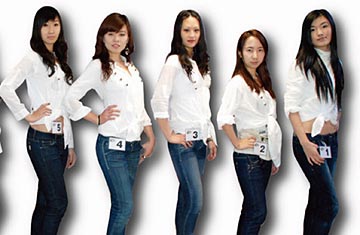
Contestants in the Miss China in Spain pageant
Having traded her bikini for an ensemble that consisted of denim short shorts, a perilously cropped fur vest and towering stilettos, Contestant No. 9 shimmied under the bright lights in approximate time to the pounding hip-hop music. Her contribution to the talent competition, such as it was, involved much gyrating of hips and stroking of thighs, but from the sidelines, pageant organizer Esperanza Liu beamed approvingly. "Spaniards think we Chinese only care about work," she told TIME. "We want to show them we care about beauty too."
That, it seems, was the point of the first ever Miss China in Spain pageant. On Jan. 15, 16 long-limbed contestants donned swimsuits and eveningwear to parade past judges and about 500 cheering fans in a packed ballroom of Madrid's opulent Miguel Angel Hotel. Some 20 years after these young ladies' parents began taking up residence in Spain, the big hair, body glitter and, yes, tiaras were an eloquent testament that the second generation of Chinese had arrived.
There are now 130,000 Chinese migrants in Spain. Although their numbers are relatively small compared with those of other immigrants, they comprise the only group that has continued to grow in these times of economic crisis — in fact, the population increased nearly 4% in 2009. And their economic presence surpasses their demographics: they make up less than 3% of Spain's 4.7 million immigrants but represent 16% of its foreign-born entrepreneurs.
The majority of the small businesses they run are restaurants or retail stores. Indeed, entire genres like the variety shops that Spaniards, long after the introduction of the euro, persist in calling "todo a cien" (in reference to the 100 pesetas the goods on sale used to cost) are largely in Chinese hands. Ten percent of the country's wholesale textile industry is run by the Chinese. And so prevalent is Chinese ownership of convenience stores that Spaniards routinely refer to the shops as "chinos."
But in recent years, Chinese immigrants have expanded beyond these initial forms of commerce, some turning once small businesses into big ones. Li Tie, who arrived in Madrid in 1993, started out by selling handbags on a street corner and today owns a multimillion-dollar import business that supplies goods to those todo a cien stores. And Maria Li Bao, who left China 17 years ago, now owns a small empire of upscale Asian restaurants in Madrid. "Spain has been a very good place for us," says lawyer Yijong Ji Wang. "Very welcoming, and not much discrimination."
Yet as Wang notes, Spain's Chinese community — as in many other European countries — has tended to keep to itself, congregating in particular businesses and neighborhoods. "We're not truly integrated," he says. "Many Chinese don't even learn Spanish because they don't have to — they can even get TV in Chinese here."
Breaking down that barrier — on both sides — was one of the goals of Saturday's beauty contest. "The second generation is different; they have a different spirit," says pageant organizer Liu, who has broken down some barriers herself by marrying a Spaniard who, as director of Haike Marketing, specializes in promoting Spanish-Chinese business relations. "They're better educated and they want to be more integrated into Spanish culture." Given the popularity of Saturday's event, Liu expects the contest to be held annually.
As the pageant's competitors touched up their lipstick and practiced their dance moves backstage on Saturday, Elisa Zheng confessed that she speaks much better Spanish than Mandarin and hopes to one day become a flight attendant. She was shaking a bit as she slipped into her evening gown for the final competition, but nerves didn't get in the way of her poise. When at last the announcer boomed Zheng's name, and she stepped forward in her mint-colored dress to receive the tiara and a €1,000 check, she didn't shed a single tear. The same can't be said, however, of her mother Christina, who arrived in Spain two decades ago. "I'm so proud," she said as she reached for a tissue. "If you had told me 20 years ago that this would happen, I never would have believed it."
